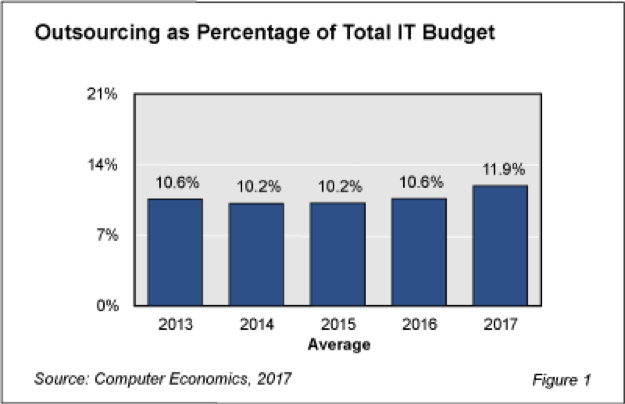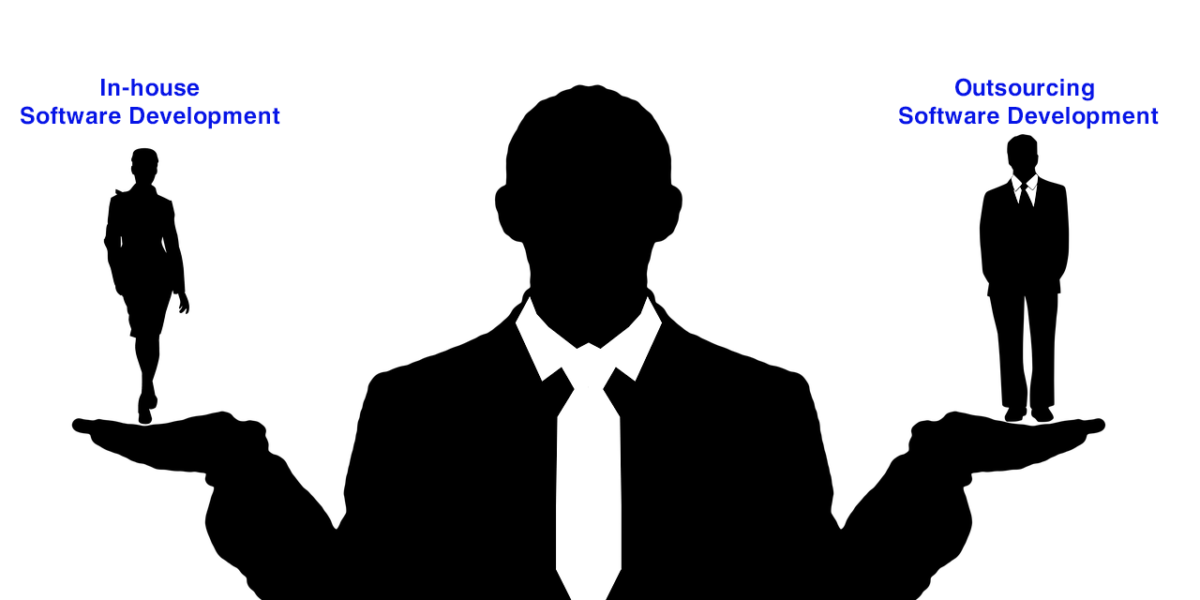
Globalization is impacting every industry trough the connection of human resources across the globe. The impact globalization has on the software industry is observed as very significant. In present day it is not unusual to see software engineers being teamed up across the globe to work on the same projects. As a result, software development has emerged into Global Software Development (GSD). Which means that software development teams are temporal and geographical dispersed. You would probably argue that teams being formulated over geographic, temporal, socio-cultural and linguistic distance can cause trouble. There is obviously truth in this, but it’s all manageable. If planned and controlled well, the benefits outweigh the costs undoubtedly.
We will explain the increasing importance of GSD and the significant benefits that will accrue for your organization in a minute. First take a look at the chart below. On average 11.9% of the total IT budget is spend on outsourcing in 2017, this represents a major increase. You may conclude that more and more organizations are conforming to the benefits of using IT-skills from an outside company.

The benefits of Global Software Development (GSD)
First, we outline the obvious benefits. These benefits tend to apply at an organizational level and are commonly acknowledged in theory and practice. Then we continue with the not so obvious benefits as proposed in the paper: “benefits of Global Software Development: Exploring the unexplored”
1. Cost savings:
Globalization makes it easier to leverage cheaper employees located in lower cost countries. The difference in wages is very significant. A European or US software developer’s salary is many times greater than that of a person with equivalent skills in some countries in Asia for example.
2. Access to skilled workers worldwide:
Companies have possibilities to leverage large pools of different skills of labor by coordinating this across distance. This way companies can expand their software development activities.
3. Reduced Time to market:
This is a great benefit for a company that is pressured to deliver faster. If you use GSD than you are maximizing productivity by handing off work from one team to another team that wakes up earlier or later. They call this the “follow-the-sun” approach.
4. Geographical distance market and customer:
GSD may allow a company to develop software closer to the customer. If you have customers in Asia for example and you are a Western software development company using GSD with Asian teams you can create good will with local customers. There is also the possibility to establish strategic partnerships to gain entrance to new markets.
The not so obvious benefits range from organizational level to task level. Benefits 5 and 6 are on organizational level, benefit 7 is on team level and benefits 8, 9 and 10 are on task level.
5. Innovation trough collaboration:
The current business environment requires and expects high-quality software. Organizations can take advantage of collaboration with team members from different national and organizational backgrounds. Sharing knowledge can lead to innovative and better results.
6. Job allocation:
As there is an influx of new low-cost labor, higher cost recourses can be assigned to more strategic activities.
7. Task modularization:
GSD is assuming that teams split their work in well defined, independent modules. This horizontally partitioning of work tasks results in each site having responsibility for the lifecycle of certain modules. This decreases coordination costs. For example, working parallel on certain modules and merging them after development.
8. Formal record of communication:
Since GSD teams are on geographical different locations the communication will be asynchronous. A written communication history leaves traces of who said what and who was responsible in certain situations. This will allow people to think about a problem before they ask or answer a question.
9. Better documentation :
There is an increased focus on documentation when working in distributed teams as communication aid. This is an advantage because project specific knowledge is written down then and easily passed on to another (part of a) project.
10. Better defined processes:
GSD encourages to formally document processes so that many different teams understand them. This increases maturity over all. If team members are co-located, the focus on formalizing processes decreases.
Outsource now!
The digital revolution is going faster than ever and it’s important to keep up in terms of innovation, efficiency and service. Outsourcing software development is a perfect strategic approach to consider for your business if you want to keep up.
Contact us for a free consultation or quotation.
Suggested Posts
How useful was this post?
Share it with your friends
Get our latest articles here!
Do you have any questions?
Help us improve the content of this Insightful blog by asking us questions. Manifera's team of experts will help you answer these questions as soon as possible.












